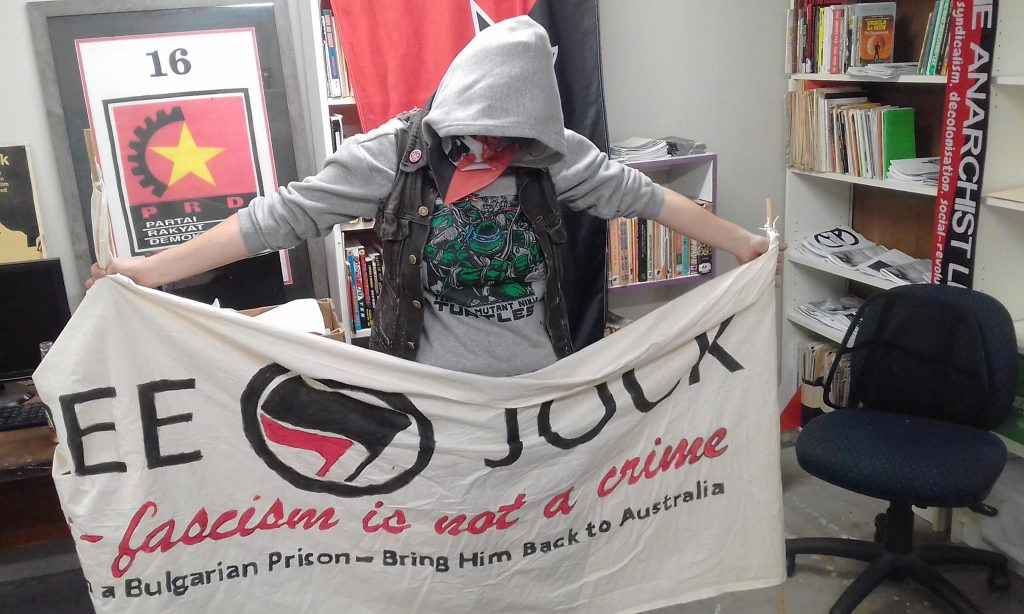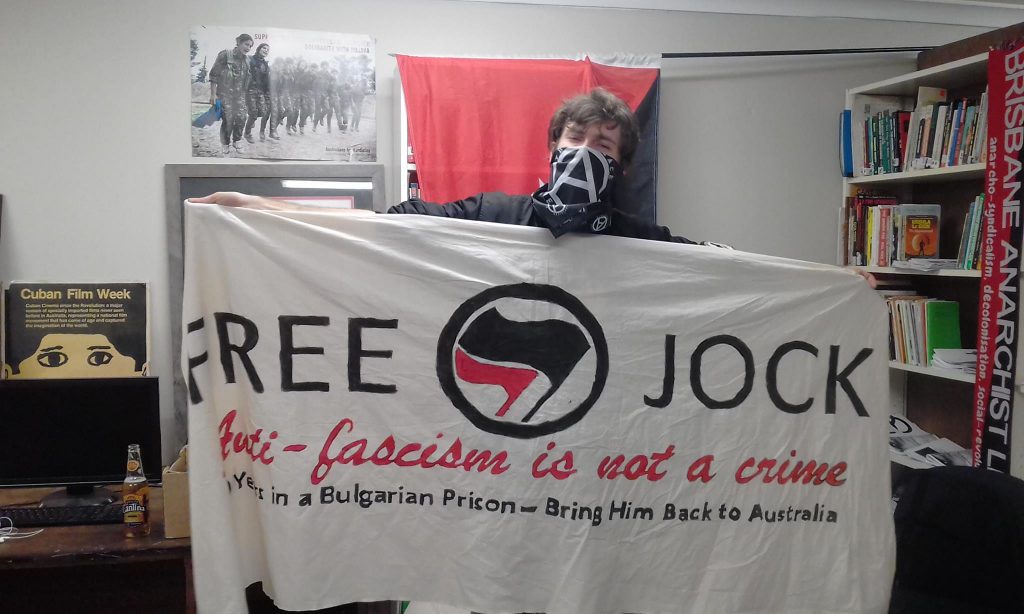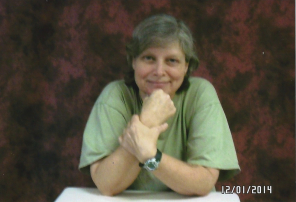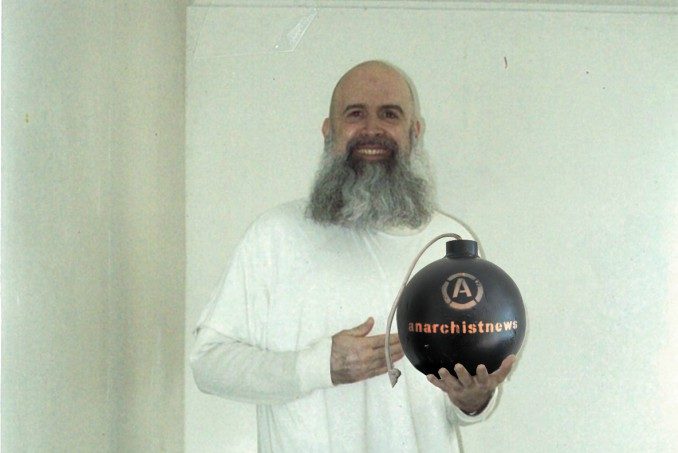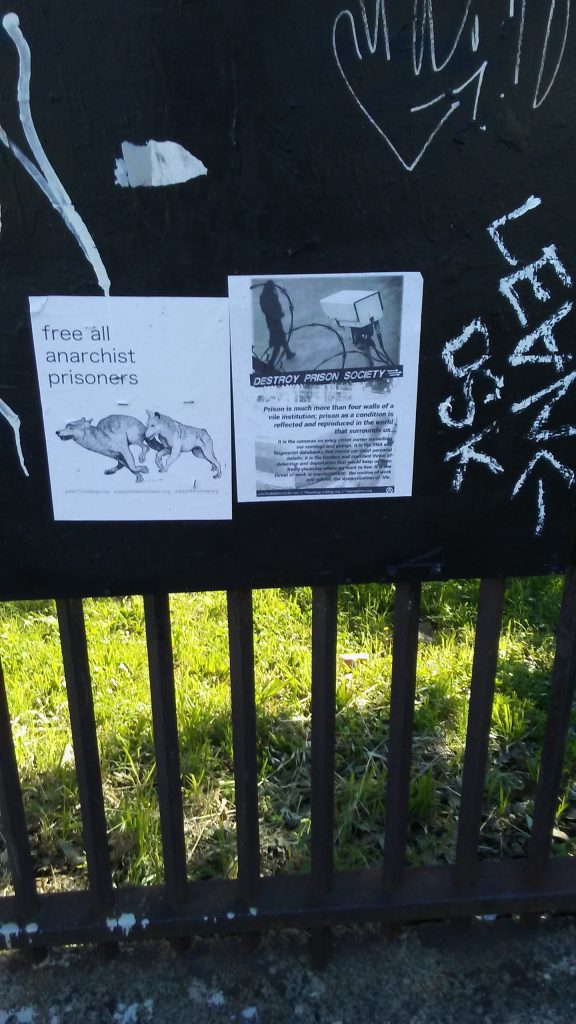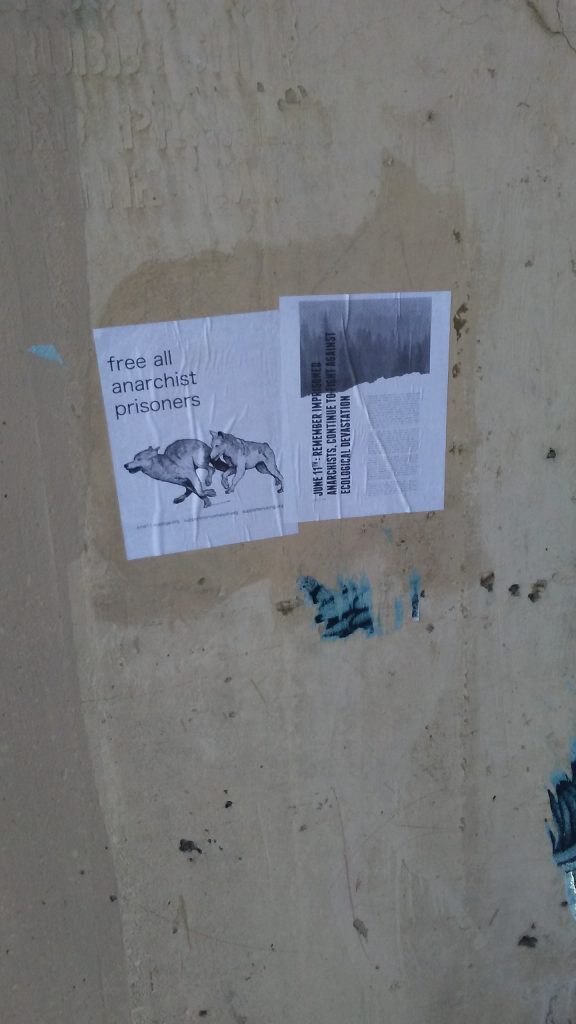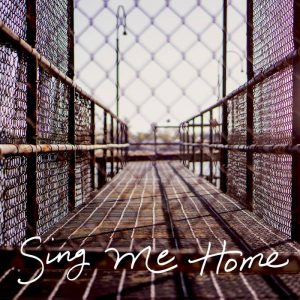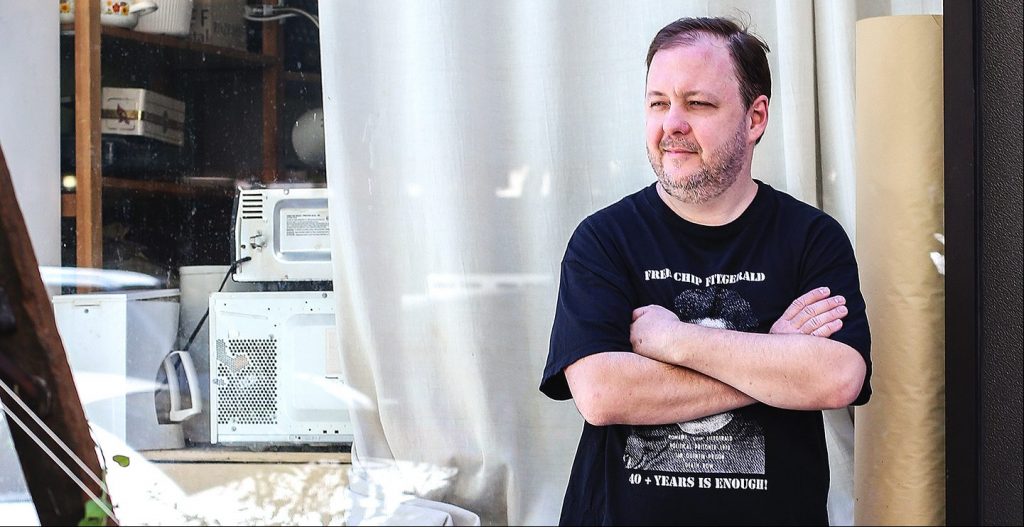
[LISTEN HERE]
In our latest interview for the June 11th International Day of Solidarity with Marius Mason & All Long-Term Anarchist Prisoners, we spoke with Daniel McGowan.
Daniel is a former eco-prisoner who did seven years in prison for actions he took part in with the Earth Liberation Front. Prior to and since his time in prison, Daniel has been active in prisoner solidarity projects, including the Certain Days: Freedom for Political Prisoners calendar.
We talk about Daniel’s experiences with solidarity on both sides of the walls, the particular importance of long-term prisoner support, which forms of solidarity felt most important during his time in prison, post-release support, Communication Management Units, inter-movement prisoner support, mutual aid, supporting New York state prisoners and younger anarchist prisoners, and the origins of June 11th.
JUNE 11TH: Can you start by telling us about yourself and your experiences with prison and prisoner support?
DANIEL MCGOWAN: Sure, my name is Daniel McGowan, and I’m a former political prisoner. I’ve done seven years in prison for actions I took with the Earth Liberation Front, or the ELF, in the late ‘90s and early 2000s. My experience with prisoner support, for most of my activist life I’ve been involved in prisoner support, and then I found myself being on the receiving end of tremendous amount of support and solidarity from friends and comrades on the outside.
J11: Can you speak to the importance of prisoner support as part of the anarchist project and other liberatory struggles? And specifically to the necessity of supporting long-term prisoners?
D: Well I think prisoner support is really something that’s needed for anyone that goes to prison. Unfortunately the networks that exist are largely built around our comrades or people that we know in prison. I think long-term is a thing that means different things to different people. I tend to think that a person who has a two year sentence feels like it’s long-term, so it’s sort of relative. But I would say that obviously the longer the sentence, the more solidarity and support is needed. I think any movement that takes itself seriously, anarchist or otherwise, needs to provide for the consequences of state repression or interactions between our movements and the right-wing, in terms of incidents between antifa and right-wing fascists. I think that without having that safety net, not only are people less inclined to take actions they feel like are part of a movement, they realize that it almost feels like a martyr situation where people are willing to confront state power or fascists and then there’s literally no one to help them or work with them when they’re in prison.
I think as a person is in prison longer, the needs often change. Prison degrades and haunts individuals, so I think the longer you’re in, the more it’s necessary. And understanding that statistically most people that go to prison come out, but we also obviously have situations where we have people with intense cases, political cases, where they potentially have life sentences, or they technically have access to parole but it’s meaningless because they get rejected all the time. I think the needs of long-term prisoners are slightly different than short-term. A short-term prisoner might have their eye on their out date, and so they don’t want to basically catch a new case, or catch new time. I think we see situations like Jared Chase where his release date has been pushed back, so he is already supposed to be out of prison, but due to interactions with the cops inside, his sentence has been extended to I believe 2019, which is obviously problematic in a lot of ways.
J11: What forms of solidarity were most important to you while you were in prison, and what could have been done better or different?
D: I think having access to people I could call and e-mail (when they finally instituted that) was really important. The fact that I knew I had a crew of people that I could rely on, that when I was bundled up and put in transit I knew that people were looking where I was, that they would reflect on the fact that they didn’t hear from me, and would be looking out for me. I liked feeling that there were these people, my family, my friends, even people I didn’t know around the country and the world, that were willing to make a phone call, to e-mail the BOP or bother them to have lawyers that were willing to come and visit me while I was in transit. I remember there’s this one time I was at Oklahoma City and my partner at the time, I found out later, paid a lawyer to come in and visit me just to get me out of the segregation unit, and for me to let the lawyer know what was going on, and that lawyer was able to relay it to my long-term lawyers and let them know. So knowing that people gave a crap about me, that I had an outlet, that I had friends that I could ask for things that made my time a little easier, that people were willing to basically pressure those in power on my behalf, that was really affirming and supportive.
As far as how things could’ve been done different, I think we learned the hard way. Because my communications were monitored, it was really hard for me to make specific requests and so of course people want to do right by you so they don’t want to do something that puts you in harm’s way. I remember for instance when I first got to the CMU, I remember thinking how awesome it’d be for people to have a support demo outside, and how that would’ve probably flustered the Bureau of Prisons, like “this dude’s from New York and he’s somehow able to mobilize people to be in the parking lot banging on pots and pans and making noise.” It’s not something the prison gets a lot of, in the Midwest and often in rural areas. But I always thought that would be something I would love, but it was pretty much impossible for me to ask, since my phone calls, even my legal visits were all monitored on some level. They’re obviously not supposed to monitor legal visits but I think it’s imperative that people with cases that are scary to the prisons understand that more than likely their phone calls and legal visits are potentially going to be recorded. So we just realized along the way that there’s basically just going to be a whole bunch of things they can’t communicate to me, and I can’t communicate to them.
J11: Can you speak more about your time in the CMUs and other tactics that the state used to try to silence and isolate you?
D: I was in the Communication Management Unit at both prisons, both CMUs. I was at the Marion one for twenty-six months, I got moved into general population at Marion and then the government concocted some fake reason to throw me back in the CMU, and I spent the remaining twenty-one months of my sentence at Terre Haute, Indiana. I think a lot of what it had to do with is that I was put there because I was in a sort of vulnerable position. I had a terrorism case, I had a violence case, since they consider arson violence, and it came with what they call a public safety factor for what they consider a greatest severity offense. So it’s the kind of case that has a lot of highlighting and asterisks on my file. I’m not a Muslim and I have a terrorism case, so when they opened up the second CMU at Marion, they put a few people in there that could basically make some point to just say, “oh no, it’s not a Muslim unit.”
They put myself and Andrew Stepanian from the Stop Huntington Animal Cruelty case, they had sovereign citizens which are from all different races and nationalities, they put an old neo-nazi from “The Order,” a group that engaged in targeting people and armored car robberies. So they put a few of us in there as their “proof” that these CMUs were not just Muslim terrorist units. I was doing academic work with a university in the Midwest, Antioch University, I was doing a Sociology Degree so I was writing a lot about my case, and I think they found those documents and saw the amount of mail I was getting, and essentially when the place I was at was asked for nominations, it was pretty easy for them to send me there because I was vulnerable because of my case. I was at a low-security prison, but it was very easy for them to put me there.
I think part of it was I wasn’t breaking any of their so-called rules, but I was writing a lot of political stuff, I was writing about the drug war, about fellow people in prison that I had met, as well as how basically fraudulent and bogus prison is and what prison does to people. I had met a ton of people when I was at FCI Sandstone that were there basically for crossing the border and who had five to seven year sentences. I met a bunch of people who were being put away for crazy thirty and forty year sentences for meth. It just opened up my eyes to a whole other element of the prison world. So I wrote a lot and I put it online through my friends and family. They were unable to give me incident reports, they were unable to stick me with that. So they just put me in a place where I think they thought I would just roll over and do quiet time.
It didn’t really work that way, I felt like I was doing quiet time and I got sent to the CMU, and that really lit a fire in me again, and I decided I was gonna go to war with them over the next five years, which is pretty much what I did. The other thing they did in terms of isolating me and silencing me was – there are particular aspects about the CMU that were pretty onerous in terms of communication, so they did things like limit the communication in CMUs to (when I first got there) one phone call a week, which you had to sign in a week in advance and you could only call one person. They made the visitation so bad it was like four hours a month. It was really kinda hard for me to ask people to come 2,000 miles to essentially come for this horrible, non-contact visit.
They monitored all the communications, I think they had people in the units that were rats, who were willing to help the government out, and they did an immense amount of rejections of my mail. So my mail going out was monitored obviously and recorded and all that, but really my mail coming in, if it was political. They were very broad in their use of rejections. I had something like 100 magazines and newspapers rejected over the time I was in prison. I pretty much gave grievances for all of them, which was my way of being a bit of an asshole and a stubborn bastard. I basically grieved every single time they rejected anything from the prison level up to DC, which is crazy. It takes like nine months, and at that point you’re allowed to sue. Obviously I didn’t sue on any of my magazine rejections, but I basically pissed them off. I wasn’t able to get Earth First! Journal or Rolling Thunder or a lot of the magazines that to this day really don’t publish anymore.
J11: A topic that has come up for us a number of times is continuing support for people as they’re released from prison. How was your transition, and what was helpful for you? What would you want other people to know about post-release support?
D: It’s interesting, I think the release thing is getting a lot more attention these days from our community because I think we’re getting better. We have a lot more people going to prison, a lot more people come out back into the movement, and we’re sort of learning the hard way how rough re-entry is. Most of the programs that exist for re-entry don’t work so well for politicized individuals for a lot of different reasons. For instance, maybe people come out and they already have good housing, maybe they have a college degree or something like that, maybe they even have job prospects, but usually people are coming out of prison with some struggles? And sometimes it’s everything: it’s housing, it’s legal difficulties, it’s ‘stay-away’ orders from felons or co-defendants.
My situation was such that I was married, I had a place I could go to live, and I got six months in the half-way house. I also had a crew of people that were really amazing in their dedication and fundraising. So when I got out I had a couple thousand dollars, actually more than a couple thousand, to buy some clothes, to buy a computer, to buy shoes. It had been six years, so I needed to replace some things. I was really good at that level. I had my material needs met, I was at the half-way house and came home on the weekends, we’d order takeout food because I wasn’t really allowed to leave. I also did very well, like I was remanded back into custody for writing an article basically about the CMU, and I had lawyers so they were able to get me out of prison the next day, which is really amazing.
But I struggled psychologically, they say you leave prison but prison doesn’t leave you. When I first came home I just had a lot going on and I had a hard time. I was at the half-way house, and it was kinda hard for me, they wouldn’t let me see a shrink or a social worker. I had some contacts from the movement that were willing to get me some access to mental health care. The half-way house, which is essentially a contractor of the government, would not accommodate that. Essentially what happened was I had a lot of two-steps forward, one-step back. And then I had a bit of crisis based on some stuff that went down in my personal life, and at that point it was kinda essential that I see someone. A friend of a friend who was a social worker offered. Because I wasn’t actually even able to go to her office, she came down and met me every week in a coffee shop near my job on my lunch hour. That’s the kind of thing not everyone has access to, and I felt really supported and spoiled by the whole thing.
And then when I was able to get out of the half-way house I saw this person in a professional capacity for three or four years. My problem was more feeling lots of anxiety, having a real hard time with crowds, and that’s the sort of stuff that everyone’s struggle when they leave prison is going to be different. I used to tell myself, “oh you only did six years,” and I was living with men that did thirty, forty years, or life. I thought I was going to get out and everything was going to be peachy keen and fine, but when I got out it was really tough, I got out and I felt like I was still in. I was really sensitive to any kind of offense, everything hurt my feelings and I wanted to fight all the time. I sort of stayed out of trouble, but inside my head it was just rolling emotions.
So I think when people come out we need to reach them where they’re at. Some people are going to get out and they’re going to have amazingly hard times with every aspect. They’ve been in a long time, they might be like, “I’ve never seen a smartphone, I’ve never seen a computer.” I taught computers in CMU and I dealt with men that had pretty much never even seen a computer or used the internet, so it can be really challenging. My situation, I was in for six years, and I had never seen an iPhone, but I certainly understood what a phone was and how to use it. So my ability to get back into things was good on that level. But everyone is going to have different situations. In New York in the last year there was a political prisoner that was in for thirty-seven years. His name is Maliki Shakur, and he came home and he took like a fish to water with phones, I mean he’s good on the smartphone, he texts, he sends photos, he knows how to use it. His housing situation was aided. But I can’t imagine he has a lot of great job prospects, hasn’t been out in the job market for thirty-seven years.
Then you have people like Zolo Azania who gets out and has a crew in the Midwest that have been helping him. Everyone’s going to have a different time, a different struggle. I don’t know if we need to have an organization, but I try to help people when they get out, and I try to help their support crews in getting through some of these issues around housing, legal support, health care especially for older folks, mental health care, all that kind of stuff. I think it’s something that we’re just starting to deal with, I know there was a wave of people that had shorter sentences like the Tinley Park Five, Jason Hammond, and the other people in the NATO Three case, they all got out.
My co-defendants and myself, a ton of us got out after serving anywhere between two and seven years. And we’re all out there in the world as felons trying to get some work, trying to deal with the issues that work presents when you’re a felon. So I think we just have to reach people where they’re at, to start sharing more information. People that are out, who are on probation and are felons, need to talk to each other more, and kinda prepare for when we know people are getting out to help them: materially, but also just as a sounding board. I talk to people when they get out if they’re able to talk to me, and just try to hear them out and see them through the tough times.
J11: How has serving years in prison changed your perspective and your practices around prisoner solidarity?
D: Well, like I said, I did a lot of prisoner support before I went to prison. Maybe something like eight years. I started doing prisoner support in the late Nineties. I did prisoner support for Rod Coronado and a number of other animal rights and eco-people. I did support for Jeff Luers. One thing, probably the main thing, is that I realized that charity-based prisoner support that is like a group doing stuff on behalf of people on the inside can be really problematic. I think regardless of whatever people on the outside think, people that are doing time know what prison is like, and are better able to decide how they need to do their time.
I know a lot of times you have political prisoners or people, political cases or politicized individuals that are very vocal, they decide to buck, so to speak. They do hard-time, they are bucking within the administration, and that’s definitely one way to do time. It’s sort of the way I did my time. I felt like what I was doing was really minor, but the way the government responded to it was so insane. But everyone needs to do their time the way they need to, and I think that when groups on the outside put expectations onto people, I think that’s problematic. I have some good co-defendants, they reported to prison, they kept their heads down and they did their time. I think at the same time that we understand that people need to do their time they way they need to, we also need to recognize that part of the time they use things like the CMU or the special management unit or supermaxes is to scare people.
So I think we do need people that are willing to struggle in prison, and not just put their head down. I’m cool with my co-defendants doing their time, a lot of them kept their head down and had their eye on the clock, and were trying to perhaps lessen the impact on their families. But I also thought that in my situation I felt like I was faced with an intolerable situation, and I thought, “who better to fight back than myself?” I mean – I’m in prison, I’m someone that doesn’t want to look askance when there’s horrible stuff going on, so I thought I was in the right position. So I think the model of working with prisoners, not for them, getting rid of that charity mindset.
I think a lot of that is happening with work that people do on the prison labor front, understanding that it’s a mutualistic relationship. A lot of old-time prisoners, long-term political prisoners or whatnot, have a lot to offer. I have some really interesting relationships with people in prison from both when I was in prison and when I got out. I definitely do support for prisoners, but they’re certainly not limited to the anarchist movement. I feel like my rapport with older leftists is very good and it’s not sectarian, and there’s no belief that I support everything they think: I’m definitely not interested in the tenets of Marxism or state-building. But I engage people on things that we have in common.
So getting away from the charity mindset, working with prisoners and helping them get their voice out there when they can’t do it themselves. But always understanding it in a context of mutual aid and solidarity and not in the context of thinking of them as just a poor person that needs help. I’m sure there are a lot of innocent people in prison – whatever innocence means – but we got to also recognize that our comrades have agency and they made choices, and we’re supporting them through the consequences of that stuff and the repression. But we don’t have to think of people as victims.
J11: So you mentioned that you were doing prisoner solidarity both before and after you went in. Do you want to tell us more about the prisoners that you’re actively supporting?
D: I got politicized through this organization that was run out of the basement of a bar in New York City called Wetlands, and it used to have these monthly or weekly meetings. So a large part of the first meeting I went to was an animal rights thing. There was someone there speaking on behalf of Rod Coronado. I got very involved in writing him. I did support for people in the Santa Cruz Two case, and a bunch of different environmental saboteurs or animal rights prisoners. That was definitely my politics at the time, limited to that, and so I wasn’t really interested in interactions with people.
I lived in Eugene, Oregon and I was friends with Jeff Leurs (“Free”), and was part of his support committee. When he got sentenced to twenty-two years and eight months, I had actually written a bunch of long-term political prisoners, almost out of desperation, and asked them for help. I realize now, and laugh at myself for having the nerve to write all these prisoners and ask them for help when they’re doing all this time, but I got a lot of really great answers from people like Marilyn Buck, and I think Leonard Peltier. There were a bunch of people that were willing to give me some advice on that. So being exposed to that out of a need, I sort of started to pay more attention to the political prisoner world.
I’d been involved for a while, doing stuff kinda related to Anarchist Black Cross political prisoner support. Since I’ve gotten out, I’ve mostly been focused on two different things: support for long-term New York State political prisoners, and then also mostly younger and newer cases from the anarchist movement. So I help out a little bit on the Cleveland 4 and NATO 3 case, I’ve made myself available to talk through legal issues that people are dealing with, helping people get lawyers for different situations. I also have been heavily involved in trying to get some of the long-term Black Panthers in New York out. It’s like Herman Bell, Jalil Muntaqim, Robert Seth Hayes, and also (not a Black Panther but a long-term New York person) David Gilbert. So I write most of those individuals, and I work with them on basically trying to raise their profile and fight back attempts from the Policemen’s Benevolence Association (basically the pig union) and the Fraternal Order of the Police, who are very actively campaigning against the Black Panthers that are going up.
So I try to do a little mix of both. My ideas about prisoner support are rooted in that we have to definitely support our comrades that we struggle with, that we fight with. I think it’s disingenuous to be part of a movement that, if your movement is effective, you are definitely coming into contact with law enforcement, and so to not see through that situation where you have comrades that are getting popped for various things, I think it’s kinda fraudulent. It’s just cheerleading if we’re not willing to support our comrades, so that’s my mindset for why I do political prisoner support, or prisoner support for Cleveland 4, or NATO 3, or Eric King, people like that. And like I said, the rest of my time I mostly spend working on the long-term New York political prisoners, but I tend to be one of these people that finds myself drawn to different campaigns if friends are asking for help.
J11: So you’ve been doing this for a long time. What are your hopes and visions for prisoner solidarity in the years to come, and how can June 11th as a project fit in to that?
D: That’s a good question. I think June 11th is a great thing. I’m not sure if people know, but I was involved in the beginnings of June 11th in 2004. June 11th is the day Jeff Luers was sentenced to twenty-two years, eight months in 2001. And he got that for burning three pickup trucks at Joe Romania Chevrolet. There was actually a very spirited rally and march, and cops got a little crazy in 2003, people in Eugene sorta pulled off this act. But in 2004 we decided we wanted to do a worldwide thing. So we did this International Day of Solidarity and Action for Jeff Luers and the FBI sort of aided our efforts by releasing what they called “an eco-terrorist bulletin,” and so there were all different events around the world, there were 57 of them, and all the domestic ones were messed with by the FBI. There was a tremendous amount of law enforcement attention paid to it, to even a film screening in Worcester, Massachusetts.
I was actually in New York at the time, and we went around ticketing SUVs with these fake tickets, and in Eugene they had a bunch of very large events. And so we did it in 2004, we did it in 2005, and then I got indicted and the people that were part of Jeff’s crew extended it to a day of action for eco-prisoners. I think it’s a good thing, and I think that things change, and days of action morph. I understand going from the Eco-Prisoners, to Marius and Eric, and now Marius and Long-term Anarchist Prisoners. I think these sort of days are good in terms of rallying support, and reminding everyone that we have people inside. I hope that there’s material gain that can be made for people in terms of raising funds and raising awareness.
From my own personal perspective, I think it’s important for anarchists to not just do prisoner support for anarchists. I think that there’s a broader world out there, and that when we limit ourselves just to people that share our ideology or our identity, we’re really limiting ourselves in some ways from mutualistic work, as well as lessons we can learn from elders that are inside. I think also when we consider when we’re doing work that’s limited to anarchist prisoners, but then we’re asking other people to care about anarchist prisoners, it seems a little empty if we’re not engaging in some sort of mutualistic prisoner solidarity with other movements.
I know it’s probably not something that many people want to hear, but I do think that when we focus on just anarchist prisoners invariably, we end up focusing on a lot of white people, which when we’re considering the racial identities or racial makeup of the prison system in the United States, it is largely a black and brown and red thing. And I just think we need to be addressing in our work the white supremacist culture that we are in. That said, I think June 11th is something to support, and I think it’s a good opportunity to rally support for anarchist prisoners, and I think it should continue. In terms of my hopes for prisoner solidarity movements or whatnot, I think we have a situation in the next couple of years where we have an opportunity to get a lot of the old-timers out on parole. I think we have a limited time to do so.
Campaigns that are not specifically focused on political prisoners but sort of are focused on the prison system as a whole are important, I think not only on their own accord, but also that those kind of campaigns could end up helping the political prisoners, whether they’re the old-timers or the new folks. I’m thinking about groups like RAPP (Release Aging People in Prison). That’s a group that exists in New York and a few other places, and they’re addressing the fact that people have been put in prison for insane sentences, these 25 to life sentences. And they’re beating back this punishment idea that America has, where if someone does something wrong according to the system, they have to be punished, and it’s just this lifelong thing. What groups like RAPP and others have done has done more to change the narratives around prison than sometimes the somewhat narrow focus of the political prisoner groups.
So I hope in the next five years we get a significant amount of the old-timers out, and I think we have a lot to do in terms of the current anarchist prisoners. From my understanding a lot of them do not have access to adequate funds, and in situations like Jared Chase where it’s been very difficult to maneuver through the complexity of having someone that’s suffering from a terminal illness that affects his cognition and his judgment, at the same that he’s being kept in the SHU in segregation, that is rapidly contributing to that situation. So I think the anarchist movement can really gain a lot and get a lot better at supporting its prisoners. That said, I think June 11th can be part of that, and I think it should.
J11: Are there any other projects you’re involved with or things you have interest in that you’d like to share with us?
D: Yeah sure. I’ll just tell you about one project I work on: it’s this calendar called Certain Days: Freedom for Political Prisoners. We are currently collecting submissions until June 7th, from people that are incarcerated. It is a calendar that is in its seventeenth year. It exists as an educational thing about prison and prisoners, but also exists as a fundraiser. So last year we raised a bunch of money, we gave it away to different groups, like that group I mentioned, RAPP, a group called Addameer which works with Palestinian prisoners, and a group called the Unist’ot’en Camp, which is an indigenous homestead in Canada made up of Unist’ot’en people that are basically resisting development in their territory.
We’re right between calendars right now. We’re working on the 2018 calendar, but if you check out certaindays.org online, you can find it on Facebook and Twitter too. You can see our call for submissions, as well as bookmark it for later because our calendars come out in August. We also usually get organizations to sponsor prisoner calendars. The prisoner calendars are a lot cheaper, so groups will give us like $100 and you can send us prisoners’ names and we will send them virtually free of charge. That’s pretty much what’s got my attention right now. Like I said, I’m working on supporting a number of different anarchist prisoners. Trying to help them increase their capacity to raise money, get books, get birthday cards, stuff that makes their days a little more passable, and support them in whatever they’re working on.

